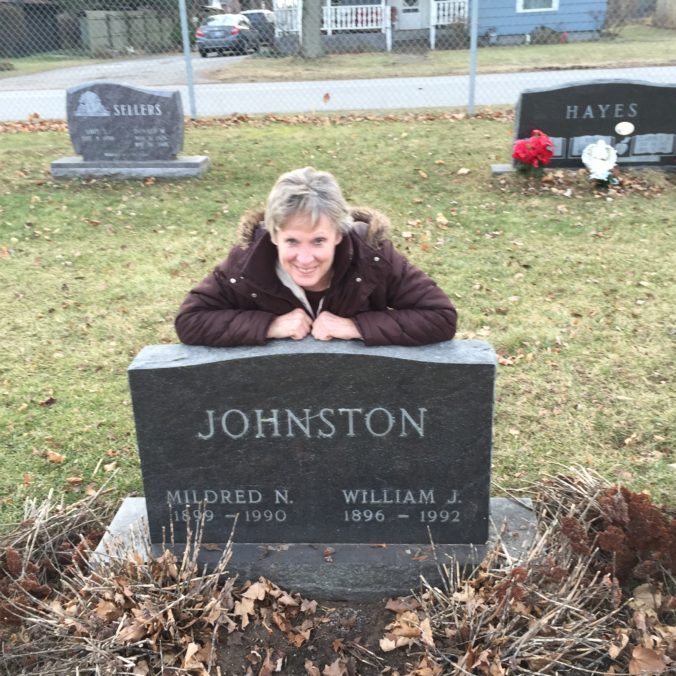I’m approaching monumental Post #500 after just over 15 months of writing this blog. The number 500 has always been significant, living in the backyard of the Indianapolis Motor Speedway for 20 years of my life. It was exciting to be part of the Greatest Spectacle in Racing, the one-and-only Indianapolis 500 that takes place every May. Racing has always followed me, as I have followed it. I’m sure it’s only by coincidence that Formula One came to Austin once we moved there, and now the Indy Car Series is coming to Portland this Labor Day weekend. Racing has somehow always been my loud, fast neighbor that I simply can’t avoid no matter where I go.
I can never think of racing without fond memories of my grandfather William Jennings Johnston. I vividly recall driving him from our home town of Elkhart, Indiana to Indianapolis for a week with me and my family. That was about 1990, just after my Grandmother, Mildred Neoma Walker Johnston, passed away at age 91. His visit was a memorable experience, as I rarely had spent time with just him alone, so we spent our time getting to know each other better. We went to the Indiana World War Memorial and the Soldier’s and Sailor’s Monument. At that time, I was involved in a fundraiser called “Chip in for Victory” to raise restoration dollars for the Miss Victory statue that crowns the monument in the center of downtown Indy. I worked for WIBC Radio and put together a partnership with Chesty Potato Chips and the Indianapolis Colts, so that was part of our discussion about my job. We found his name, along with that of his son and my father, inscribed in the marble interior as a tribute to the Indiana Veterans who served. “Thank You for your service, Gramps!”
I have a picture of my grandfather smiling at our kitchen table next to a box of Kellogg’s Corn Flakes – his favorite. I also took him to the Indianapolis Motor Speedway museum where he told me a great story. He and his buddies hitchhiked the 164 miles from Elkhart to Indianapolis for what I believe was the 1915 race. They had the actual program on display. On the way back from the race they stopped for the night and slept in the hayloft of a farmer’s barn. My grandpa laughed about the dream he had that night that had him crashing in the race, and the shock of rolling off the bail of hay he was sleeping on. He hadn’t been back to the Speedway for 75 years, so I can only imagine the changes that he saw when we took the tour bus around the two-and-a-half mile oval. It was a memorable day and an unforgettable story, as I tried to imagine myself going to an Indy Car race where the average speed was just under 90 miles a hour, only 60,000 attended, and the mechanic sat in the car next to the driver. Carl Fisher was the pace car driver, Howdy Wilcox won the pole, and Ralph DePalma drank the milk, winning the 5th annual race in what would have taken over 6 hours. I think of my grandpa every time I go to an auto race. He would have died two years after our visit at the age of 96.
Life is nothing but a race, and retirement is the final pit stop. You need a strategy to get to the finish line, and mine included saving money for travel. I’m sure my grandfather would been amazed at all the places I’ve seen, when in his era it would have taken more than five jarring hours in a car to travel that 164 mile route just to get to Indianapolis. Since I was not a genetic descendant of my grandfather, I can’t claim his longevity or that of the father who adopted me. The man I believe to be my birth grandfather, Pete Banister, only lived to be 61, so I have surpassed his life span already by five years. His father Henry only lived to be 42, but there is hope since his grandfather, Labein, died at the ripe old age of 84. That should give me the twenty years I need to complete my travel bucket list. I do not yet know the identity of my birth father, so there is yet no history on that side of the genetic pool. However, with the newly discovered dangers of my vices like alcohol consumption, Diet Coke, and Advil, I have probably shaved a few years off my life, despite all the miles I run everyday.
If I could somehow manage to be in as good of health as my wiry 96-year old grandfather, who by the way was a Camel smoker for many years, I would take that challenge of living past the age of 100. However, if I developed Alzheimer’s like his son who raised me and died at 93, I would not want to put that burden on my family. In my opinion, longevity is strictly relative to good health, otherwise it may not be worth it. So far, it has been! My grandfather was never a rich man, but he never spent a day in the hospital. That’s the kind of wealth that I want as I continue to approach the waving checkered flag at the inevitable finish line.

Leave a Reply